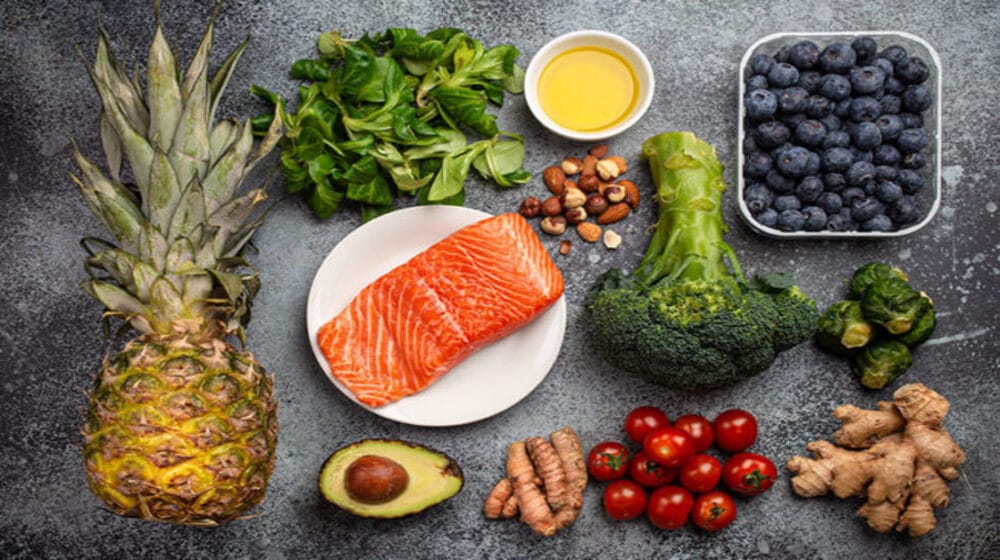Inflammation is the body’s natural response to protect itself against any foreign agent that may be harmful. When directed at a threatening invader, inflammation protects the body against the invading agent. This type of inflammation is called acute inflammation and is essential for the normal functioning of the body.
Chronic inflammation occurs in response to other unwanted substances, such as toxins from cigarette smoke or an excess of fat cells, and persists for long periods. Many major diseases have been associated with chronic inflammation, including diabetes, blood pressure, heart disease, arthritis, cancer, depression, and Alzheimer’s. disease.
An anti-inflammatory diet can help the body fight off inflammation for good and lowers the overall inflammation in the body. Numerous studies have proven that it is a powerful tool in combating chronic inflammation because of its anti-inflammatory effects.
Anti-Inflammatory Diet
Here are some proven ways to make your diet an anti-inflammatory diet:
1. Consume 25 g of Fiber Every Day
A diet high in fiber, including fruits, vegetables, whole grains, and whole foods, helps to reduce inflammation due to the presence of naturally occurring anti-inflammatory phytonutrients. (Phytonutrients are plant-produced chemicals or compounds that have antioxidant and anti-inflammatory properties).
Consuming at least 25 g of fiber a day provides many benefits besides reducing inflammation. Some high-fiber foods that can help you fulfill the recommended intake of 25 g of fiber a day are grains (barley, quinoa, oats), vegetables (broccoli, carrots, brussels sprouts, artichoke, green peas), fruits (avocado, berries, bananas, oranges), nuts, and seeds (almonds, chia seeds, walnuts).
2. Consume a Variety of Fruits and Vegetables
Consuming a variety of fruits and vegetables helps to reduce inflammation due to the different phytonutrients found in them. More than 25,000 phytonutrients are found in plant foods that provide various health-promoting properties, including anti-inflammatory and antioxidant properties.
Fruits and vegetables are packed with powerful antioxidant compounds, like proanthocyanidins, carotenoids, flavonoids, and ellagic acid that aid in fighting inflammation and cell damage.
3. Limited Intake of Saturated Fats
Saturated fats are found in animal products and tropical oils such as red meat, palm oil, coconut oil, butter, and cheese. Research shows that an increased intake of saturated fatty acid is associated with increased inflammation in the body. Limiting your intake of saturated fats to 10 percent of your daily calories reduces inflammation and ultimately lowers the risk of developing heart disease.
4. Consume Omega-3 Fatty Acids-rich Foods
Omega-3 fatty acids lower the risk of chronic diseases, including heart disease, cancer, arthritis, and other diseases linked to chronic inflammation. Omega-3 fatty acids can fight inflammation as these reduce the production of inflammatory molecules and substances.
Incorporating omega-3-rich foods like flax seeds, walnuts, beans, fatty fish, or omega-3 supplements in your diet can help to counter inflammation.
5. Eat Fish at Least Twice a Week
Fish, such as salmon, oysters, herring, mackerel, trout, sardines, and anchovies, are an excellent source of omega-3 fatty acids and have high anti-inflammatory properties.
The general dietary guidelines recommend eating fish two or three times a week. This is because the omega-3 fatty acids in fish provide numerous health benefits, including protection against inflammation.
6. Avoid Processed and Refined Foods
Research shows that processed and refined foods cause inflammation in your body. These include red and processed meats, high-fructose corn syrup, or foods high in added sugars or sodium.
Processed and refined foods act as triggers for inflammation and may cause increased insulin resistance, blood pressure, increased risk of fatty liver disease, and other conditions. Consequently, limiting the intake of processed and refined foods is necessary to protect yourself against the damages of chronic inflammation.
7. Avoid Trans Fats
Trans fat raises bad cholesterol (LDL) levels and lowers good cholesterol (HDL) levels in the blood. This effect on cholesterol levels increases the risk of developing heart diseases, stroke, and type 2 diabetes.
Studies show that people who consume foods high in trans fats have higher levels of C-reactive protein — a biomarker for inflammation in the body.
Reducing your intake of foods that are high in trans fat, such as margarine, fried foods, and baked goods can ultimately reduce inflammation.
8. Consume Healthy Snacks
Instead of eating processed and packaged snacks, opt for fruit, Greek yogurt, unsweetened plain yogurt, carrots, or nuts like pistachios, almonds, and walnuts.
Anti-Inflammatory Foods to Add to Your Diet
Here is a list of anti-inflammatory foods to prevent chronic, low-grade inflammation and reduce the risk of cardiovascular disease, cancer, type 2 diabetes, and other conditions:
Vegetables
- okra
- onions
- eggplant
- scallions
- garlic
- leek
- broccoli
- cabbage
- cauliflower
- mustard greens
- Brussels sprouts
- celery
- carrots
Fruits
- bananas
- blueberries
- apples
- apricots
- berries
Whole Grains
- barley
- oatmeal
Nuts, Seeds, and Legumes
- flax
- walnuts
- kidney beans
- soybeans
- navy beans
- pistachios
- almonds
Fish
- salmon
- oysters
- herring
- mackerel
- trout
- sardines
- anchovies
Herbs and Spices
- turmeric
- ginger
- cloves
- cinnamon
- rosemary
- sage
- thyme
Foods to Avoid
Here is a list of foods that contribute to the inflammation in the body:
- High fructose corn syrup
- High-sodium foods
- Refined sugar
- Artificial sweeteners
- Hydrogenated or partially hydrogenated oils (trans fat)
- Processed foods
- Unhealthful oils


























